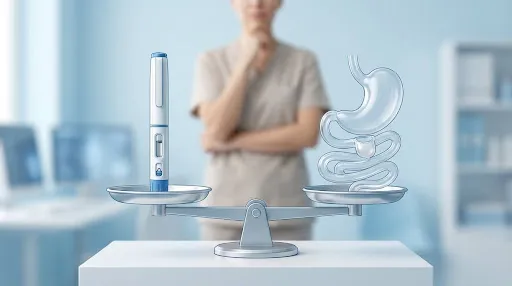Antibiotics are widely prescribed to fight bacterial infections, but they don’t come without side effects. While diarrhea is commonly associated with these medications, some people experience the opposite problem, constipation. So, can antibiotics cause constipation? The answer is yes. In this article, we’ll explain why it happens, what’s going on in your gut, and the practical steps you can take to prevent or relieve it.
Can Antibiotics Cause Constipation?
Yes, according to a 2022 study, antibiotics can sometimes indirectly lead to constipation. This risk will depend on the type of antibiotic a person is taking and other factors, like dietary and lifestyle factors.
Here's how antibiotics cause constipation:
-
Disrupts the Gut Microbiome: Research states that antibiotics negatively affect the gut microbiome (an ecosystem that consists of beneficial as well as harmful bacteria). This slows down bowel movements and causes constipation.
-
Changes Intestinal Motility: By affecting intestinal muscles and nerves, antibiotics reduce the passage of food through the digestive tract, resulting in constipation.
-
Causes Dehydration: By increasing the loss of water via urine or lowering the absorption of fluid in the gut, some antibiotics can lead to dehydration, which hardens stools and makes it tough to pass them.
-
Reduces Digestive Enzymes: A disrupted microbiome by antibiotics can impact the release of enzymes that are required for effective digestion, which contributes to constipation.
-
Impacts Nervous System: By causing dysregulation (improper functioning) of the nervous system, antibiotics can affect digestive processes and cause constipation.
Factors Affecting Your Risk of Constipation After Using Antibiotics
These factors increase the risk of constipation with antibiotic use:
-
Type of Antibiotic Used: Doxycycline and clindamycin are the antibiotics that are more likely to interrupt gut flora or motility compared to other types.
-
Individual Composition of Gut Microbiome: People with a more sensitive gut microbiome are more prone to digestive issues, such as constipation.
-
Duration and Quantity of Antibiotic Treatment: Longer courses and higher doses of antibiotics might have more deeper effect on the gut microbiome and digestive process.
-
Diet During Treatment: Consuming bland foods or low-fiber-rich foods while sick can slow the digestive function.
-
Hydration Levels: Lack of enough water in the body can harden stools, making their passage difficult.
-
Use of Other Medicines: Taking antibiotics with antacids, anti-nausea medicines, or painkillers can increase constipation risk.
-
Lack of Exercise: Low physical activity or bed rest while sick can slow down bowel movements, leading to constipation.
-
Age: Older people have a slower metabolism, which makes them more susceptible to constipation due to low gut motility and reduced fluid and fiber intake. Also, children have a growing gut microbiome, it makes them highly susceptible to the negative effects of antibiotics.
-
Pre-existing Digestive Problems: A history of chronic constipation or IBS (Irritable Bowel Syndrome) can increase the risk of constipation.
-
No Probiotic Use: Not taking probiotic-rich foods during or even after antibiotic treatment might slow down the restoration of good gut bacteria.
Which Antibiotics Are More Likely to Cause Constipation?
Though any antibiotic can cause constipation, the most common ones are:
-
Clindamycin
-
Ciprofloxacin
-
Erythromycin
-
Tetracyclines
-
Cefdinir
-
Azithromycin
-
Cephalosporins
-
Amoxicillin
-
Fluoroquinolones
These antibiotics can negatively affect the gut microbiome and cause constipation, but they also lead to other digestive issues.
Other Digestive Side Effects of Antibiotics
As antibiotics impact the gut microbiome, an individual can also experience these gastrointestinal symptoms of antibiotics, along with constipation, including:
-
nausea
-
vomiting
-
diarrhea
-
stomach pain
-
bloating
-
gas
According to a 2024 study, antibiotics can also lead to the development of Clostridium difficile (C. diff) infection with symptoms such as:
-
watery diarrhea
-
constipation
-
loss of appetite
-
weight loss
-
intense cramps in the belly
-
tender or swollen belly
-
pus or blood during bowel movements
-
fever
Some symptoms of Clostridium difficile infection can be fatal in some people. Hence, one should see a doctor if these symptoms persist or last longer.
How to Recognize Antibiotic-associated Constipation?
Watch for these symptoms that can indicate that your constipation is due to antibiotic use:
-
Infrequent bowel movements: Having fewer than three bowel movements a week.
-
Hard or lumpy stools: Hard or lumpy stools that are difficult to pass.
-
Straining during bowel movements: Straining while trying to pass the stools.
-
Abdominal pain or bloating: Cramps, pain, or bloating in the abdominal area.
If these symptoms do not subside or become severe after discontinuing the antibiotics, consult your doctor for effective medical help.
Timeline of Onset of Symptoms:
-
During treatment: Within the first few days of antibiotic treatment.
-
After completion: 1 to 2 weeks after completing the treatment course.
-
Variable duration: Might resolve immediately or last for many weeks.
How Long Does it Take to Recover From Antibiotic-Induced Constipation?
No set time length is recommended to recover from antibiotic-related constipation. The appropriate duration will depend on the type of antibiotics, hydration levels, balanced diet, and gut health of an individual. In most cases, after discontinuing the antibiotics, constipation may get relief in some days or a week, especially if you consider staying well-hydrated, adding probiotics to your diet, and consuming fiber-rich foods.
However, if constipation lasts for more than one week and is accompanied by serious discomfort, seek medical attention.
How to Manage Antibiotic-Associated Constipation?
Try these science-backed strategies to restore gut balance and relieve constipation:
-
Increase your Fiber Intake: Add fiber-rich foods like whole grains, vegetables, fruits, nuts, or oats to your diet as fiber promotes a healthy gut microbiome, easing digestion.
-
Stay Hydrated: Drink plenty of water throughout the day to keep stools soft, ease their passage, and prevent constipation.
-
Take Probiotics: Yogurt, kefir, sauerkraut, or any probiotic supplements like Magnesium Citrate, and vitamin C are natural probiotics for gut health that help restore beneficial gut bacteria.
-
Limit Processed Food Intake: Processed foods like white bread, fast food, processed meats, pastries, and frozen meals can be hard on your digestive system and might contribute to constipation, so limit their intake or avoid them.
-
Exercise Regularly: Engage in physical activities such as brisk walking, cycling, swimming, or jogging regularly to stimulate digestion and relieve constipation.
-
Consult Your Doctor: If constipation persists or is severe, talk to your healthcare provider for guidance.
Note: In case of severe and persistent constipation, seek a doctor's advice. They may help with fiber supplements, laxatives like Miralax or Dulcolax, and stool softeners. Additionally, they may recommend "enemas," which involve introducing a liquid directly into the rectum using a small tube to help with defecation. The choice of treatment will depend on the severity of the constipation and how quickly you want relief.
When to See a Doctor?
Seek medical help if you experience:
-
Constipation that lasts for more than 3 to 5 days
-
Severe bloating or abdominal pain
-
No bowel movement after having laxatives
-
Nausea or vomiting
-
Unable to pass gas
-
Bloody stools
-
Bowel obstruction symptoms, such as severe cramps or vomiting
These can indicate more severe health issues that need immediate medical treatment.
Treatment for Antibiotic-Induced Constipation
Here are some approaches:
Conventional Treatments
-
Osmotic Laxatives: Examples include Miralax, which helps draw water into the intestines, making the stools soft and easing their passage.
-
Stool Softeners: Examples include Colace, which adds moisture to the stool and prevents it from becoming hard. Thus, easing their pass.
-
Stimulant Laxatives: Stimulate the contraction of bowel muscles, which aids in moving the stools through the intestines.
-
Enemas: Involve inserting fluid into the rectum, which softens and moves stool, thus easing bowel movements.
Natural Remedies
-
Hydration: Drink a lot of water throughout the day to hydrate your digestive system and support its functions.
-
High-Fiber Foods: Add fiber-rich foods, such as legumes, vegetables, fruits, and whole grains, to your diet to improve gut activity.
-
Exercise: Practice exercises (like jogging, walking, and yoga) regularly to stimulate the intestines and facilitate healthy and easier bowel movements.
-
Warm Lemon Water: Helps kickstart the digestive tract.
-
Prune Juice: Its natural laxative effects can soften stools and stimulate bowel movements.
Other Potential Causes of Constipation
In certain cases, constipation while taking antibiotics may also occur due to the following factors:
Lifestyle factors:
-
Not consuming adequate fiber
-
Dehydration
-
Not practicing enough exercise
-
Changes in regular routine like eating or going to sleep at different times
-
Consumption of dairy products in large amounts
-
Resisting the need to go for bowel movements
-
Stress
Medications that Can Cause Constipation:
-
Strong pain medication codeine, oxycodone, and hydromorphone
-
Nonsteroidal anti-inflammatory drugs (NSAIDs) such as ibuprofen and naproxen
-
Antidepressants like fluoxetine or tricyclic antidepressants
-
Antacids such as Tums
-
Iron pills
-
Allergy medicines like antihistamines
-
Blood pressure medicines, like calcium channel blockers and beta-blockers
Medical Conditions Linked to Constipation:
-
Hypothyroidism (inadequate production of thyroid hormone by the thyroid gland)
-
Diabetes
-
Uremia (increased levels of urea and other waste products in the blood)
-
Hypercalcemia (high calcium levels in the blood)
-
Irritable bowel syndrome (IBS)
-
Pregnancy
So, keep a watch over antibiotic-induced constipation symptoms, and seek medical help before constipation leads to more complications like hemorrhoids (piles), anal fissures, rectal prolapse, fecal impaction, or bowel incontinence and urinary tract infection (in rare cases).
Final Thoughts
So, can antibiotics cause constipation? Yes, as we have learned in the article, antibiotics can indirectly lead to constipation by affecting the gut microbiome, changing intestinal activity, reducing digestive enzymes, and increasing dehydration issues. This side effect is temporary and also manageable with fiber-rich foods, proper hydration, probiotics, and regular exercise. Moreover, along with antibiotics, other factors like stress, dehydration, not consuming adequate fiber, eating dairy products, medicines, and medical issues like irritable bowel syndrome (IBS), diabetes, etc., can also be the culprit.
So, keep a watch over symptoms of constipation, and if any symptoms persist, consult the healthcare providers for proper evaluation and treatment.
Frequently Asked Questions
Can antibiotics cause constipation in children?
Yes, it can affect children by disrupting their gut microbiota. In case of severe or persistent constipation, see a pediatrician.
Is constipation a side effect of all antibiotics?
No, it's not. Diarrhea is a much more common side effect than constipation.
Should I stop taking antibiotics if I get constipated?
No, don't stop these medications without a doctor's advice. Instead, talk to the providers for effective solutions like over-the-counter remedies or lifestyle changes.
What is the best probiotic to take after antibiotics?
Lactobacillus rhamnosus GG is the best probiotic strain that can help restore the gut microbiome and lower the risk of antibiotic-induced diarrhea.
How long does constipation last after antibiotics?
It may resolve after completing the course. However, for some individuals, it may last for a few weeks for full recovery. The duration depends on antibiotic type, course length, and other individual factors.
Can you take laxatives with antibiotics?
In most cases, you can safely take. But always consult a doctor first to avoid any potential interactions.
-User-1754377709.png)
Reviewed by







